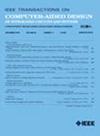Magnifier: A Chiplet Feature-Aware Test Case Generation Method for Deep Learning Accelerators
IF 2.7
3区 计算机科学
Q2 COMPUTER SCIENCE, HARDWARE & ARCHITECTURE
IEEE Transactions on Computer-Aided Design of Integrated Circuits and Systems
Pub Date : 2025-01-10
DOI:10.1109/TCAD.2025.3528358
引用次数: 0
Abstract
The development of deep learning has led to increasing demands for computation and memory, making multichiplet accelerators a powerful solution. Multichiplet accelerators require more precise consideration of hardware configurations and mapping schemes in terms of computation, memory, and communication patterns compared to monolithic designs, in order to avoid underutilization of performance. However, there is currently a lack of performance testing methods specifically tailored for multichiplet accelerators. Existing testing methods primarily focus on correctness testing and do not address potential performance issues from a hardware perspective. To address these issues, this article proposes Magnifier: a test case generation method for performance testing of multichiplet accelerators. First, we analyze typical multichiplet accelerator prototype from the perspectives of computation, memory, and communication patterns, and summarize a chiplet feature-aware operator task set. Next, we define the test evaluation metric interdevice percentile performance standard deviation and use a candidate operator set to construct a sampling space for model-level test cases. Finally, we build a generative adversarial network to learn the distribution of high-diversity test cases, enabling the rapid generation of high-quality test cases. We validate the proposed method on both simulated and real multichiplet accelerators. Experiments show that Magnifier can improve the metric of test cases by up to 3.42 times and significantly reduce generation time, providing valuable insights for optimizing the hardware and software of multichiplet accelerators.放大器:一种用于深度学习加速器的芯片特征感知测试用例生成方法
深度学习的发展导致对计算和内存的需求不断增加,使得多芯片加速器成为一个强大的解决方案。与单片设计相比,多芯片加速器需要在计算、内存和通信模式方面更精确地考虑硬件配置和映射方案,以避免性能利用率不足。然而,目前缺乏专门针对多芯片加速器的性能测试方法。现有的测试方法主要关注正确性测试,而不是从硬件的角度解决潜在的性能问题。为了解决这些问题,本文提出了Magnifier:一种用于多芯片加速器性能测试的测试用例生成方法。首先,从计算模式、存储模式和通信模式三个方面分析了典型的多芯片加速器原型,并总结了一个芯片特征感知算子任务集。接下来,我们定义测试评估度量设备间百分位性能标准偏差,并使用候选操作符集为模型级测试用例构建采样空间。最后,我们构建了一个生成对抗网络来学习高多样性测试用例的分布,从而能够快速生成高质量的测试用例。我们在模拟和真实的多芯片加速器上验证了所提出的方法。实验表明,Magnifier可以将测试用例的度量提高3.42倍,并显著缩短生成时间,为优化多芯片加速器的硬件和软件提供了有价值的见解。
本文章由计算机程序翻译,如有差异,请以英文原文为准。
求助全文
约1分钟内获得全文
求助全文
来源期刊
CiteScore
5.60
自引率
13.80%
发文量
500
审稿时长
7 months
期刊介绍:
The purpose of this Transactions is to publish papers of interest to individuals in the area of computer-aided design of integrated circuits and systems composed of analog, digital, mixed-signal, optical, or microwave components. The aids include methods, models, algorithms, and man-machine interfaces for system-level, physical and logical design including: planning, synthesis, partitioning, modeling, simulation, layout, verification, testing, hardware-software co-design and documentation of integrated circuit and system designs of all complexities. Design tools and techniques for evaluating and designing integrated circuits and systems for metrics such as performance, power, reliability, testability, and security are a focus.

 求助内容:
求助内容: 应助结果提醒方式:
应助结果提醒方式:


